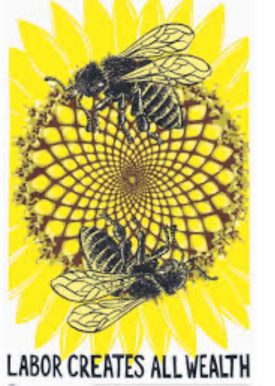
LOS ANGELES (US), March 29— We’re facing the grim realities of fascism and genocide. An antiracist book group has been meeting since before the pandemic to learn how the world got to be this way and how to change it. Last week we discussed Rev. William Barber’s White Poverty.
Poverty in the US is a huge hidden problem. Barber writes that for 140 million people in the US (43%) a $400 trip to the emergency room or another emergency expense would be catastrophic. White people make up the largest section of the poor.
Omar pointed out that the ruling class media have defined “working-class” as white and “poor” as black. Jim summarized the argument: “Poor white people have more in common with other poor people than they do with the white elite.”
Barber’s Poor People’s Campaign strategy is a “moral fusion” in which poor people are the swing voters who can defeat the fascist MAGA agenda.
It didn’t work in the last elections. As Eileen said, the Democrats claimed that everything was fine, showing their disconnect from ordinary people. Many poor and disaffected voted for Trump.
Focusing on “poor people” rather than the working class robs us of our power.
“Social class is not about where you fall on an imaginary line between $0 (or negative) net worth and whatever obscene wealth Musk has,” Lucy said.
“Social class is a relationship. There’s us—the working people, who have to sell our labor power to survive, and there’s the bosses who profit from our labor.
“What’s good for them is bad for us—low wages for us means higher profits for them; high pay for us means less profits for them.”
Richard said that on-the-job exploitation is just one aspect of how poor people are robbed. There’s high rent in slum housing, unequal social services, taxes for war, pay day lenders, and more.
That’s true. But what’s the main thing?
Workers are forced to sell their labor power. That’s all we have, and the necessities of life have price tags. We compete in the labor market and get paid the going rate, influenced by skills and training, class struggle, and sexist and racist divisions.
Labor transforms cloth into shirts, flour into bread, a hole in the ground into coal, cadmium, iron, or petroleum. The labor invested in that process is the source of all economic wealth. Work transforms raw materials into commodities.
The difference between wages and the value added in the production process is the source of all economic value in capitalism. That surplus value is where profits come from. The exploitation of labor at the point of production, and the fact that those who own the means of production get rich off our sweat is the fundamental contradiction in capitalist society and the basis of their political power.
Eileen and Charlie nodded in agreement as Lucy said that everyone who works for a living knows they do something valuable, and they don’t get paid what it’s worth. Organizing the working class is powerful and inspiring.
Langston Hughes wrote: “We are like the bees. We work, and our work is stolen from us. We are like the bees, but it won’t last forever.” Cindy said that instead of the Poor People’s Campaign’s victim mentality, we should organize a party of worker bees.
Charlie had said earlier that he had always been a liberal not a radical. He didn’t want the disruption, danger, and chaos of a revolution. But the disruption has been brought to us. Radical change, he said, may be unavoidable.
Eileen quoted Musk: “Empathy is the downfall of Western Civilization.” She declared that empathy and a commitment to the common good are essential. Everyone agreed.
“My understanding of communism is a society organized around collectivity and empathy,” said Lucy.
We can’t get to communism by “moral fusion” or voting for Democrats or Greens. We have to seize the means of production and build a society where we produce for the common good, not for profits. That will take armed revolution, and a party with a strategy to win. Join us in building that in the International Communist Workers’ Party.
Read our pamphlet:
Political Economy here

